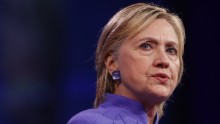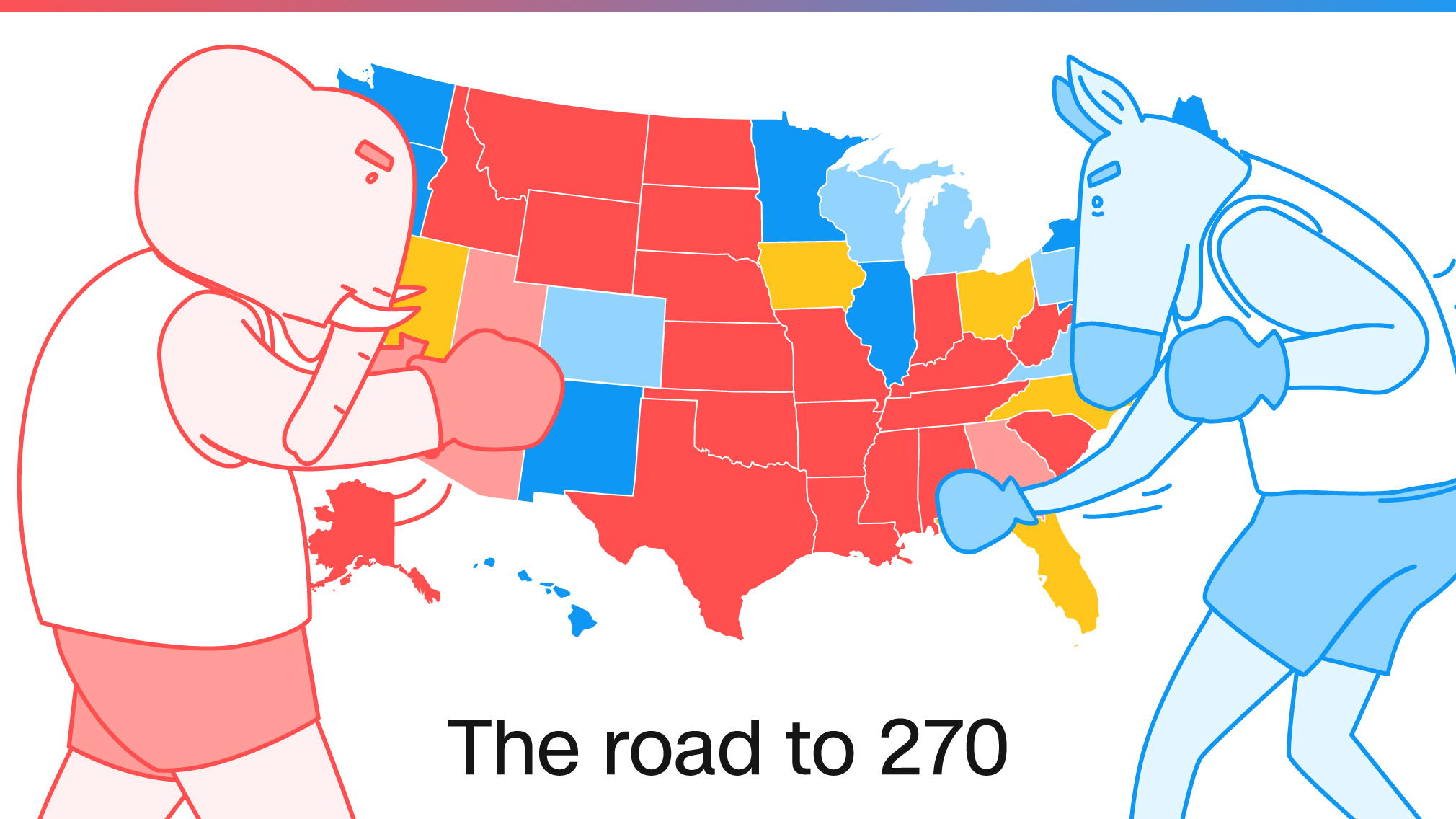How Hillary Clinton could win
Hillary Clinton has advantages heading into the final stretch of the campaign that any presidential candidate would envy: a fleet of popular surrogates, a mountain of cash and an opponent who is often sidetracked by self-inflicted wounds.
Yet the Democratic nominee enters this home stretch in a dead heat against Donald Trump, according to a CNN/ORC poll released Tuesday.
The close contest heading into the fall underscores Clinton's vulnerabilities on trust and honesty -- and her need to summon a relentless and efficient ground game, even if many of her voters are fueled more by revulsion toward Trump than excitement about her.
But in many ways, the nation's changing demographics make this Clinton's race to lose.
"In a sense, Trump can't win this election," said veteran pollster Neil Newhouse. "But Hillary can lose it."
In order to succeed where 17 Republican candidates failed to beat Trump, Clinton must maintain an incessant focus on her unpredictable rival and persuade voters that he lacks the temperament, character and knowledge required of a potential commander-in-chief.
Clinton, press do awkward dance at 30,000 feet
Clinton has already adopted an aggressive approach this week. She's held briefings for reporters on her new campaign jet two days in a row. She slammed Trump's character and failure to release his tax returns. And she blasted his business career, which is at the center of his campaign as full of "scams" and "frauds."
That is one way of trying to keep the conversation away from the private email server and accusations about the Clinton Foundation that appear to have hurt her standing in recent weeks.
Despite signs the race is narrowing -- the CNN/ORC national poll showed her two points behind Trump among likely voters -- Clinton's insists she's not rattled.
"I don't really pay attention to polls," she told reporters on her plane Tuesday. "When they are good for me, and there have been a lot of them that have been good for me recently, I don't pay attention. When they are not so good, I don't pay attention. We are on a course that we are sticking with."
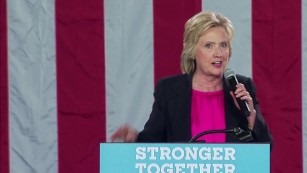
Clinton, Trump trade jabs over national security
A senior Clinton campaign official predicted single-digit battles across the swing states that will decide the election. But ultimately her campaign stresses it expected a close race and single digit battles in swing states, but believes it has multiple routes to 270 electoral votes and that Trump has a much narrower path
Some Clinton critics have, however, warned that her approach in August -- spending much of the month fundraising away from TV cameras after the Democrats' successful convention in Philadelphia -- lacked the go-for-broke energy of her rival.
"Trump is running a high-risk campaign right now. They have to, because they are behind and have eight weeks to go," Newhouse, who was a pollster for 2012 Republican presidential nominee Mitt Romney, said before Clinton upped the pace after Labor Day.
"I don't think her campaign has shown any real guts or faith in their candidate. They're not bold. They are setting themselves up for a potential loss by a thousand cuts."
Seizing on demographic and geographical advantages
It is without dispute that the hurdles for Trump are enormous. With assistance from teleprompters, he has becomed more disciplined as a candidate, but he has yet to convince voters in swing states, where Clinton leads most polls, that he is fit to be president.
For Clinton, the demographics of the electorate work in her favor, and she appears to be reassembling the Obama coalition that was decisive in the 2008 and 2012 elections. She leads Trump among voters under the age of 45 by 54% to 29% and among non-whites 71% to 18%, according to the CNN/ORC poll.
Hillary Clinton
to be the next US President
63%
live odds
Will the odds go up or down?
Democratic strategist and pollster Celinda Lake noted that Trump has consistently trailed by about 12 points where Romney was among married women in 2012. Romney also ran strong among white women -- and led President Barack Obama in exit polls among white women 56% to 42%.
Trump's campaign has yet to show any real effort to improve his image among women, beyond his attempt to appear more moderate with his minority outreach to African-Americans.
Trump is also some 20 points behind his Democratic opponent among college-educated women, Lake said, compared to Romney and 2008 GOP presidential nominee John McCain, who were about 5 and 8 points behind, respectively.
Beyond that, the demographic where Trump runs strongest -- non college-educated white men -- is dropping as a share of the electorate each year.
"So he is relying on an ever-diminishing pool of votes, where she is relying on an ever-expanding portion of votes," Lake said. To win, she said, "He would need to win the first debate; he would need to have a collapse of Democratic turnout; and he would really need to close the race with independents and women."
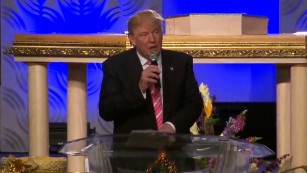
Donald Trump speaks to black voters at Detroit church
The likelihood of those factors falling into place is slim. But the one way to put the race in reach for Trump, she said, "is to assume that it's out of reach."
So the key for Clinton will be getting those vital constituencies out to vote. That's where her high-powered roster of surrogates comes in.
Obama, First Lady Michelle Obama, Vice President Joe Biden and her primary foe Bernie Sanders remain highly popular among key sectors of the Democratic coalition.
They will be vital to driving up swing-state turnout in Democratic strongholds like Cleveland, Philadelphia, Northern Virginia, Richmond, Virginia, and parts of Florida that could decide the election.
Addressing the trust deficit
Clinton is certain to seize on any foreign policy or temperamental missteps by Trump to bolster her argument that her foe is a "loose cannon" who can't be trusted with America's nuclear arsenal.
His efforts to reach out to minorities in recent weeks have managed, in some cases, to further alienate them. His campaign has yet to demonstrate it can string together, not just a couple of good days, but a good two months, given his disadvantages on the electoral map.
And beyond just having a good first debate later this month, Trump must force Clinton into making some mistakes to have a chance of winning, strategists said.
The two candidates face similar hurdles in the sense that both may find it almost impossible to change voters' opinions about them at this point. After all, Clinton and Trump are the most unpopular nominees of any major party in memory.
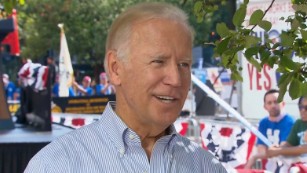
Biden: Clinton knows she has a trust problem
Both Clinton and Trump are widely distrusted. In the CNN/ORC survey, only 42% had a favorable impression of the former secretary of state while the real estate mogul was barely better with 45%.
Clinton clearly has work to do on the trust issue, though. Fifty percent of voters said Trump was more honest and trustworthy. Only 35% chose Clinton.
"People just don't trust Hillary Clinton, and they don't trust her -- not on the basis of one single thing -- but on the basis of whole collections of things going back over 20 to 30 years," said Democratic pollster Peter Hart, noting that voters cite an array of her controversies from Whitewater to her email server.
The trust factor -- as well as the sense among many voters that they can't relate to Clinton or understand her as person -- loom as challenges for the former secretary of state, because there is no one thing she can do in the next two months to fix those issues.
Because of the depth of distrust, voters are unlikely to give her the benefit of the doubt if something goes wrong, or she faces a new set of revelations, Hart said.
"They're locked in terms of who she is on the issue of integrity," Hart said. "There is not an individual issue that she can address and that has a tremendous negative effect. All of this is baked in.... It doesn't mean that she's going to lose the election. It's like driving your car on the shoulder: that's fine, unless a car nudges you over and then you've got nothing going for you."
The trust factor -- as well as the sense among many voters that they can't relate to Clinton or understand her as person -- loom as challenges for the former secretary of state, because she has been trying to do that throughout the campaign, but has only a short time before voters begin casting absentee ballots.
Avoiding overconfidence -- and selling her message
A month ago, when she led Trump by double digits in the polls, Clinton's odds of victory looked good. Historically the candidate who led in the polls two weeks after the conventions went on to win the election.
But this campaign has defied patterns of history before. Clinton's campaign warned against overconfidence, in part to keep Democratic voters engaged.
Though Obama's numbers are above 50% -- no small achievement for a late-second-term president, Clinton always faced a historically difficult feat as a candidate seeking the third successive term for the Democratic Party.
Moreover, her three decades in politics made her a particularly ill-suited choice for an electorate whose chief desire is change. She's effectively an incumbent with dynastic baggage facing an outsider candidate in Trump who built a campaign on voter mistrust of establishment politicians.
But Clinton allies argue that her dual-pronged message has been more succinct this time than it was in 2008.
While many swing-state voters say in interviews they have no idea what her message is, her strategists say it is piercing through in local markets where she is advertising: the idea that she will put families first while Trump would put himself first; and that Americans are "stronger together" while Trump would be a divisive force.
Mo Elleithee, a former Democratic strategist who is now executive director of the Georgetown University Institute of Politics and Public Service, pointed to one ad that Clinton ran just before the Nevada caucuses that he said was a perfect distillation of that message. It was one featuring a little girl who was afraid that her parents would get deported. Clinton told the girl to let her worry about it.
"It's incredibly hard for any positive message to break through" in this toxic political climate, Elleithee said. "If she can make this: 'I've got your back' argument compelling enough, she can chip away" at voter distrust.
That work is important not only to help her win but also to help her govern, he said. "She needs to address that issue now and continue until after the election.... She could win this race comfortably with no positive message, but they should not mistake a comfortable win for a mandate."
News Courtesy: www.cnn.com

